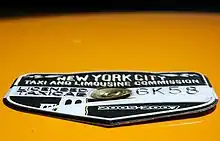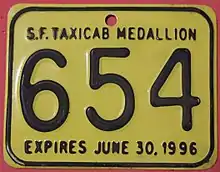Taxi medallion
A taxi medallion, also known as a CPNC (Certificate of Public Necessity and Convenience), is a transferable permit in the United States allowing a taxicab driver to operate. Several major cities in the US use these in their taxi licensing systems, including New York City, Boston, Cambridge, Massachusetts, Chicago, Philadelphia, and San Francisco.
The medallion system is a government-created intentional constraint on the supply of taxicabs, and since historically cities have increased the number of medallions much more slowly than the growth in demand for taxis, medallions have generally been considered a great investment;[1][2] though recently the increased supply of cars for hire created by ridesharing companies has been eroding the value of medallions.[3][4][5]
Historical prices
Boston
In 2013, the price of a medallion was $625,000.[6] In 2014, that price had risen to around $700,000.[7] Shortly thereafter however, medallion prices began to sharply decline. According to the Boston Herald, by the end of 2018, the value of a Boston Tax Medallion had collapsed; after reaching an all time high in 2014, prices had fallen to around $40,000, representing a 95% loss.[8]
Cambridge
In 2014, a medallion was worth nearly $700,000.[7]
Chicago
The total value of all medallions and assets related to them had a value of $2.5 billion in Chicago in 2013.[9] In 2012, medallion prices ranged from $87,000 to $385,000.[10] In 2015, Chicago's average medallion price was under $230,000, down 30% from 2014.[9] In 2018, they had dropped to a range of $30,000 to $100,000.[11]
New York City
The total value of all medallions and assets related to them had a value of $16.6 billion in New York City in 2013.[9]
In 1962, the market value of a medallion was around $25,000. The price rose steadily. In 2005, an individual medallion was around $325,000 while a corporate medallion was approximately $375,000.[12] Around 2010, the market value of a medallion was around $600,000. It peaked around 2013 at over $1,000,000. Between 2014 and 2015, New York City's non-corporate medallion price dropped 45%.[9] In 2015, the price had fallen to approximately $650,000.[13] As of 2018, one can now purchase a medallion for less than $200,000. On July 11, 2019 sixteen medallions were offered at auction, three of which sold for $137,000, $136,000 and $138,000, while another thirteen medallions had no bidders.[14] Since many cab drivers took out loans in order to afford medallions when values were high, many have subsequently been forced to declare bankruptcy. In September 2020, Marblegate Management LLC, the largest holder of NYC medallion loans, decided to write off $70 million in debt indigent cab drivers still owed.[15]
References
- Horwitz, Jeff; Cumming, Chris (2012-06-06). "Taken for a Ride". Slate. Archived from the original on 2012-07-30. Retrieved 2018-01-15.
...the taxi medallion system, a regulatory scheme in which the right to operate a taxi is thoroughly divorced from the actual work of driving one... When New York City first issued taxi medallions in 1937, they were just licenses, worth $150 in today’s terms. ... In New York, Chicago, and Boston, the number of medallions has barely budged since they were issued in the 1930s. New York went 60 years without issuing new medallions, and it's only been a trickle since. ... New York’s tight limits on the number of medallions in circulation has suppressed the supply of cabs. There are 13,237 medallions now outstanding, a few hundred fewer than in 1937, but a huge supply of drivers competing to lease them.
- Van Gelder, Lawrence (May 11, 1996). "Medallion Limits Stem From the 30s". The New York Times. Archived from the original on 2017-03-25.
...after the stock market crash in 1929, job seekers swelled the ranks of New York City cabdrivers to 30,000 in 1930. ...too many cabs were chasing too few passengers in the Depression years. "The Haas Act tried to remedy that problem by stopping the issuance of any new vehicle licenses."
- Madhani, Aamer (18 May 2015). "Once a sure bet, taxi medallions becoming unsellable". USA Today.
- Badger, Emily (20 June 2014). "Taxi medallions have been the best investment in America for years. Now Uber may be changing that". The Washington Post.
- Under Pressure From Uber, Taxi Medallion Prices Are Plummeting, Josh Barro, The New York Times, 27 Nov. 2014
- "The Tyranny of the Taxi Medallions".
- "What to do about taxi medallions". The Boston Globe. August 5, 2015.
- https://www.bostonherald.com/2018/10/21/competition-hacks-taxi-business/amp/
- Sibilla, Nick (16 August 2016). "Are taxi medallions too big to fail, too?". Fox News.
- https://www.cityofchicago.org/content/dam/city/depts/bacp/publicvehicleinfo/medallionowners/taxicabmedalliontransferprices010313.pdf
- https://www.cityofchicago.org/content/dam/city/depts/bacp/publicvehicleinfo/medallionowners/2018TaxicabTransferPrices040118.pdf
- http://www.taxi-library.org/goldman2006.pdf
- "The 'Uber Effect' Is Crushing Taxi Medallion Prices And Spilling Over Into Public Markets". 1 October 2015.
- "Episode 643: The Taxi King". NPR. 23 May 2018.
- www.marketwatch.com/amp/story/70-million-in-nyc-taxi-cab-debt-forgiven-2020-09-13
- MATHIS, JOEL (March 9, 2015). "The Price of a Philadelphia Taxi Medallion Keeps on Dropping". Philadelphia.
- "3 Taxi Medallions Sold by Phila. Parking Authority, At Bargain-Basement Prices". CBS Television Stations. 6 May 2015.
- "For San Francisco Cab Drivers, Once-Treasured Medallions Now a Burden". KQED. 24 September 2015.
External links
| Wikimedia Commons has media related to Taxi licenses. |

